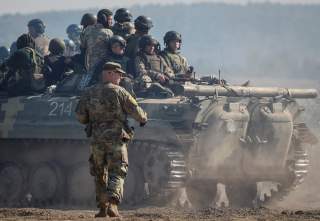Groupthink Resurgent
As our debacles in Vietnam and Iraq demonstrate, expert consensus is not always a recipe for success. Perhaps it should come as no surprise that American policy toward Ukraine has also been steeped in illusions.
But it should have dawned upon our national security establishment long ago that it takes much more than holding free and fair elections, firing corrupt officials and passing reformist legislation in order to transform foreign polities that are mired in dysfunctional post-Communist patronage politics. Such transformation is beyond America’s ability to effect. And it should also have been evident to these experts that would-be recipients of American largesse have become quite skilled at playing upon America’s hopes for democratization in order to attract U.S. political support and win assistance aid.
Basing U.S. foreign policy on such a transformational agenda has done little to advance vital American interests, but it has proved to be a good recipe for getting stuck in a perpetual cycle of elevated hopes and dashed expectations. It has entangled us in factional infighting in foreign political cultures that we do not adequately understand, and it has made us ripe for manipulation by cynical foreign political operators. The competing claims made to U.S. representatives by rival Ukrainian factions about meddling in our 2016 election, the inclusion of Hunter Biden on Burisma’s board of directors and the jocund suggestion to Vindman that he become Ukraine’s defense minister are all too reflective of this problem.
What is striking about our current interagency consensus is not just that it is failing. More disturbingly, those who adhere to its tenets seem to be incapable of imagining that there might be any other valid ways of understanding and responding to the challenges we face in Ukraine and Russia. And because they cannot conceive of a legitimate alternative, they are quick to anathematize deviation from their conventional wisdom. They cast anyone who thinks otherwise as either ill-informed, ill-intentioned or ill-served by false Russian narratives.
THE TRUTH is that the United States does have a sensible alternative to its current approach to Ukraine. Neither Washington nor Moscow is currently in any position to consider grand bargains over Europe’s security architecture, despite the fact that their clashing views of this broader question lie at the root of the conflict in Ukraine. But we could certainly entertain a more modest approach that assures Moscow that Ukraine is not and will not be a candidate for NATO membership, while also preserving Kyiv’s freedom to seek its preferred economic and political associations. This would not only facilitate détente in the broader U.S.-Russian relationship, but it would also expand the space for liberalization inside Ukraine, because it would reduce the geopolitical stakes of Ukraine’s internal reforms. Such an approach would not be a reward for Russian aggression, nor would it be a cynical bargain struck over the heads of the Ukrainian people. It would simply and pragmatically reflect the uncomfortable realities we face in Ukraine and Russia.
It is entirely unsurprising that the government experts in the impeachment hearings share a common set of analytic assumptions and policy beliefs. For bureaucrats, group consensus enhances job security and helps professional advancement. Challenging the conventional wisdom is seldom rewarded when annual performance reviews are written, and when consensus policies fail, that failure is collective rather than individual. There is safety in numbers; blame that is shared by everyone is in effect attributed to no one.
But for our broader national interests, groupthink can undermine security. It did in Vietnam. It did in Iraq. It did in Georgia in 2008. And it is doing it again today, in Ukraine.
George Beebe is Vice President and Director of Studies at the Center for the National Interest, and former head of Russia analysis at the Central Intelligence Agency.

